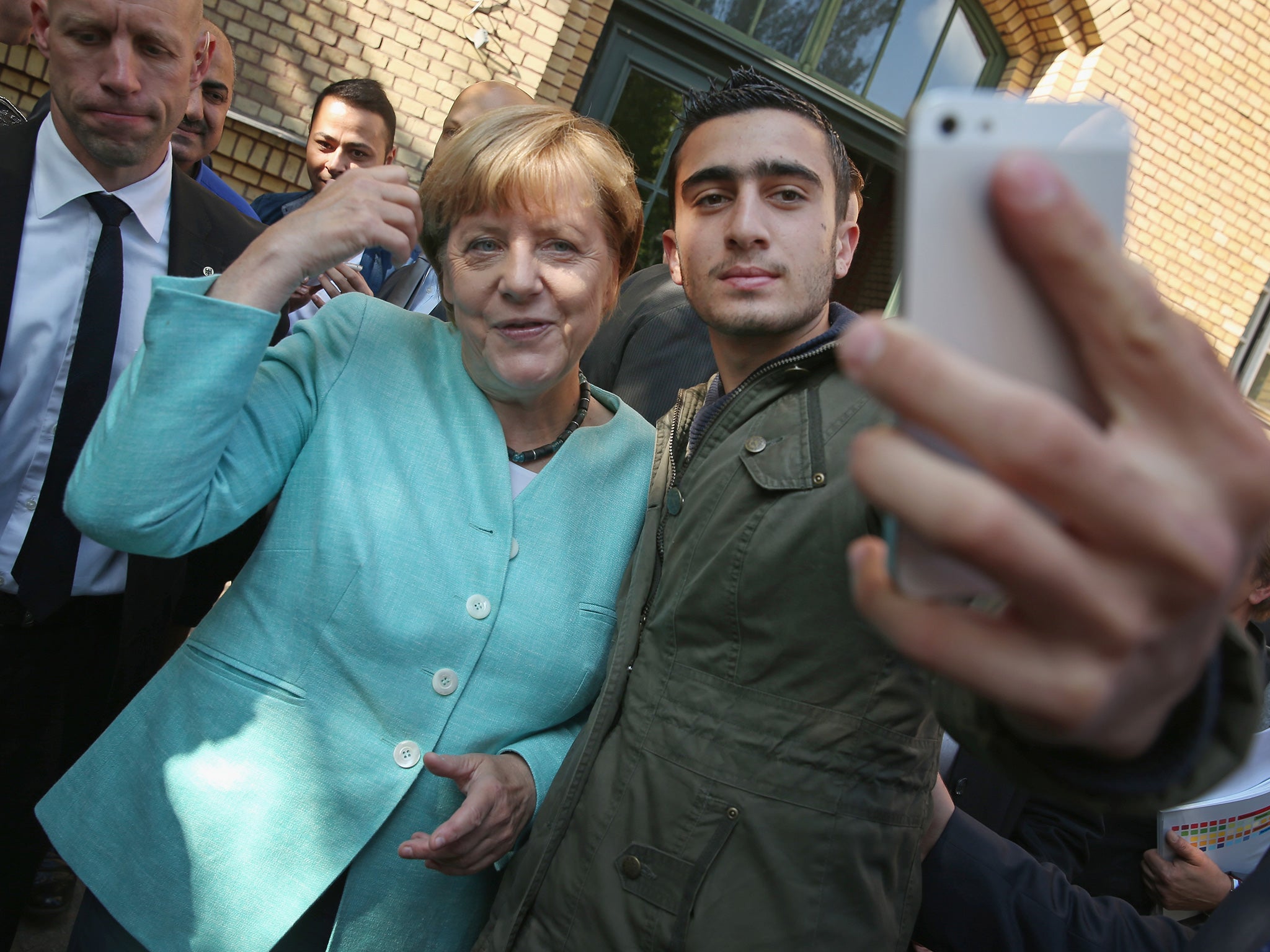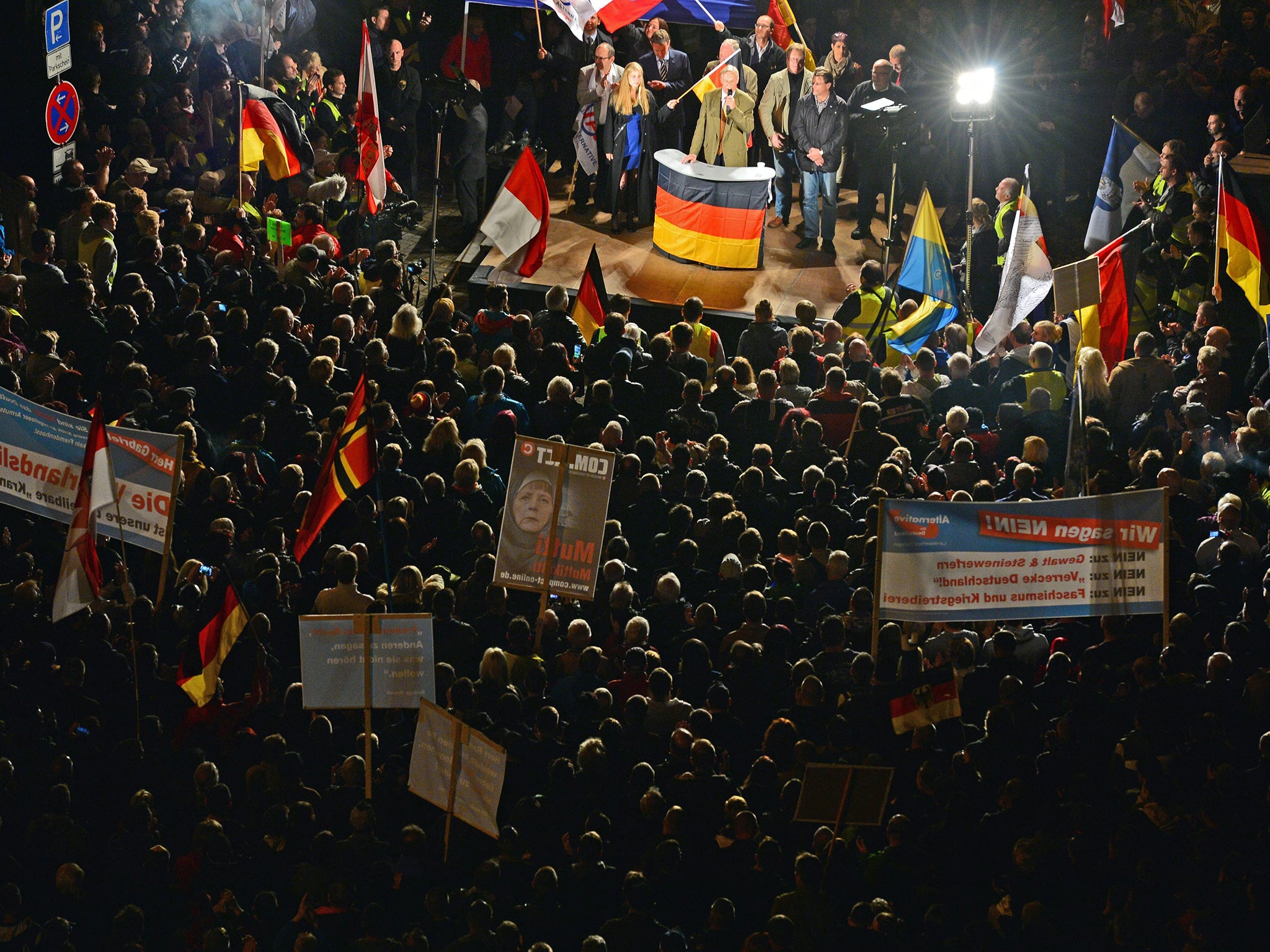Refugee crisis: Nearly half of Germans say Angela Merkel's 'welcome' policy is wrong
Even moderates are accusing the German Chancellor of going too far, too fast with refugees, the ‘welcome culture’ is evaporating and border transit camps are planned to send back unwanted migrants

When a disgruntled member of Angela Merkel’s ruling Christian Democrats attempted a weak jibe at the German leader’s open-door refugee policy, he asked her why she had not already set up tents for migrants in front of the Reichstag in Berlin.
Ms Merkel’s response was disarmingly honest. She said a refugee camp in front of the Reichstag might upset the tourists who visit the building each day. “Anyway, they would think Merkel had gone crazy,” she added.
Clearly hoping that the rest of the European Union would come to her aid, in this respect Ms Merkel finds herself disappointed, left in the lurch and almost alone. In recent days it has appeared as if the refugee crisis she is accused of helping ignite with a “selfie” of herself with a migrant in September, has run out of control.
Ms Merkel has dismissed charges that it encouraged thousands of predominantly Syrian and Afghan refugees to head for Germany in particular, although reports from Berlin’s embassies on the west Balkan route are said to have suggested otherwise.

“Do you think that hundreds of thousands of people would leave their homes and embark on this difficult road just because of a selfie with the Chancellor?” Ms Merkel said at the weekend. She does not like the idea that it helped spark Europe’s refugee crisis. But her political future now rests almost entirely on whether she can meet the challenge – the biggest her country has faced since the fall of the Berlin Wall.
Apart from those on the far right there are few in Germany at the moment who would be prepared to say that Ms Merkel has taken leave of her senses. Yet with the country facing a potential influx of some 1.5 million migrants this year alone, the number of those who think that she has gone too far and too fast with her refugee policies is rapidly rising. The “welcome culture” that saw thousands of Germans greet refugees from Syria and Afghanistan in September has all but evaporated. A poll published yesterday by the Emnid Institute showed that 49 per cent of Germans now think Ms Merkel’s refugee policy is wrong; 39 per cent approve. At the start of the crisis, the figures were the other way around.

The public’s growing disapproval is mirrored by political unease. Hardly a day goes by without Ms Merkel being attacked by the head of a party who should be her close political ally. Horst Seehofer, the Bavarian prime minister and leader of the state’s conservative Christian Social Union, has banned Ms Merkel from his party’s annual conference because of fear that she might be “booed down”.
Bavaria has so far borne the brunt of the crisis. An estimated 175,000 refugees entered Germany via the southern German state last month. Mr Seehofer has complained that “no society can cope with an influx on this scale”. He is now threatening to take Ms Merkel to Germany’s Constitutional Court.
The Chancellor’s Social Democrat coalition partners agree: “We cannot go on continually taking in more than a million refugees each year and trying to integrate them,” complained the Social Democrat leader Sigmar Gabriel and Ms Merkel’s Social Democrat Foreign Minister Frank-Walter Steinmeier.
Even the respected President, the former East German dissident Joachim Gauck, has not minced his words: “Our capacity to take in refugees is limited, even if the limits have not yet been negotiated,” he said in a speech.
The number of far-right attacks on refugee camps is growing. Thousands are attending protest rallies organised by anti-immigration groups such as the Alternative for Germany party. In Austria today the far-right Freedom Party was poised to take control of Vienna for the first time in 70 years after an anti-refugee campaign.
Where does all this leave Ms Merkel? The Chancellor went on prime-time German television last week and told viewers that there could be no halt to the influx without effectively building another Berlin Wall. “Building fences around Germany will not help,” she insisted. At the same time she stuck to her mantra: “Wir schaffen das” (We will manage this).
Margaret Heckel, one of Ms Merkel’s several biographers, says she is convinced that she took the decision to let in the refugees on the spur of the moment and probably alone. “Since reunification Germany has been under mounting pressure from her allies to take on more global responsibility, this was a chance for Angela Merkel to show that Germany could do something,” she told The Independent. The Chancellor herself has admitted that a Germany that turned away refugees “would not be the Germany I want”.

Ms Merkel’s principled and altruistic motives may well have been determined by her upbringing as the daughter of a Protestant pastor in communist East Germany who devoted much of his life to helping the mentally ill. At the same time she is acting on the fact that Germany’s rapidly ageing population means that the country is in need of young immigrants.
In a effort to show that she was firmly back in the driving seat last week, she set up a special refugee crisis unit which is being run from her own Chancellery. Yesterday the minister in charge of the unit said Germany would aim to set up transit camps at the country’s borders to send back unwanted migrants. It looked as if after more than a month of dithering, Germany had the beginnings of a cohesive refugee plan.
Join our commenting forum
Join thought-provoking conversations, follow other Independent readers and see their replies
Comments
Bookmark popover
Removed from bookmarks